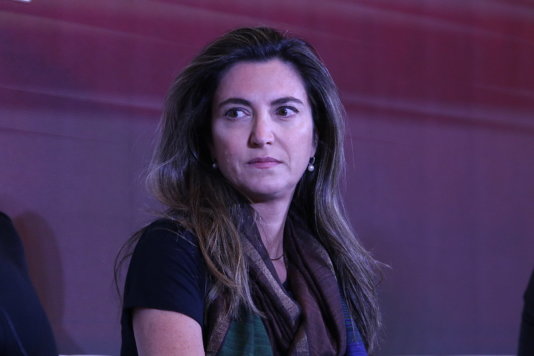- About
- Topics
- Picks
- Audio
- Story
- In-Depth
- Opinion
- News
- Donate
- Signup for our newsletterOur Editors' Best Picks.Send
Read, Debate: Engage.
The trope of the female journalist who trades sex for information is a tired one - played out in film, TV, and pop culture depictions of some glamorous alternate reality where journalists can afford designer clothes and use the story to get the man, instead of typing late into the night and missing family commitments to file a story.
But this misogynistic idea has recently made a comeback in Brazil, where government officials, including President Jair Bolsonaro himself, have gleefully echoed the debunked, unfounded sexual innuendos raised by a witness in a Congressional hearing on fake news, where he accused accomplished reporter Patrícia Campos Mello of doing just that.
Such sexist attacks against female journalists are becoming discouragingly common in Brazil, where far-right President Bolsonaro has ushered in an era of verbal tirades against the press, deliberate misinformation campaigns and presidential statements - or tweets - that do less to inform than to troll the public. The Committee to Protect Journalists (CPJ), along with partner organizations in Brazil, has documented President Bolsonaro’s anti-press crusade, as he has made vulgar gestures and bullied individual reporters, threatened to withdraw state advertising support from media, and cancelled the presidential subscription to various media outlets, defending the decision by saying reading the news was “poisonous.”
Bolsonaro’s example has put Latin America’s most populous nation on a path towards backsliding, rather than leading, on press freedom, and the international community owes it to our Brazilian colleagues to speak out before conditions for the media get any worse.
Emboldened by Bolsonaro’s example, other Brazilian officials have run with the opportunity to act out their own repressive tendencies. Rio mayor Marcelo Crivella has repeatedly attacked specific media outlets, and in December finally made good on his promise to ban reporters from media conglomerate Globo from city press conferences. Last month, federal prosecutors charged Intercept Brasil co-founder and editor Glenn Greenwald with cybercrimes for his communications with sources who shared documents with The Intercept. A judge declined to allow the case to proceed, but the charges looked like a warning shot to many investigative reporters and journalists working with confidential sources across the country.
The risks for Brazilian journalists, especially those covering contentious issues like corruption, land rights or police violence, are nothing new. In the last decade, 25 Brazilian journalists have been murdered in connection with their work, and CPJ is still investigating an additional 11 cases.
On 12 February, Brazilian journalist Lourenço “Léo” Veras was shot and killed at his home just over the border in Pedro Juan Caballero, Paraguay - a notoriously dangerous hotspot for journalists on both sides of the border.
Despite some progress in investigations and a few notable convictions in recent years, the majority of cases of journalists killed in Brazil - most of them rural reporters from small towns - remain unsolved. For nine straight years, Brazil has appeared on CPJ’s Impunity Index, an annual analysis that ranks countries with the worst records of prosecuting the killers of journalists.
What is new, however, is officials’ open hostility towards both the profession of journalism and specific reporters who anger them. This attitude has opened the door for violent actors - local mayors, organized crime groups, illegal loggers - to retaliate against journalists who report on their activities, secure in the belief they will face few, if any, consequences.
The breakdown in Brazil is just part of a growing global trend of autocratic pushback against the free press. Leaders from Turkey to the Philippines are taking increasingly shameless actions to silence critical reporting and control the space for independent media - where there is any left at all.
These brazen assaults on press freedom come straight from the Authoritarianism 101 textbook: to maintain control of the narrative, leaders must discredit or silence independent, critical voices. It is easy to find examples of this in Brazil - even as Congress holds hearings to investigate so-called “fake news,” misleading memes circulate in pro-government group chats and government officials stonewall reporters and spread misinformation about critical issues.
During the devastating fires in the Amazon last fall, the government launched propaganda offensives that blamed NGOs or indigenous communities for the blazes and denied scientific facts, even as the journalists who braved the heat to report on the fires faced threats for telling the truth.
But all hope is not lost for Brazil’s free press. Even as their leaders crack down, Brazilian journalists from São Paulo to Rondônia continue to fight back, shining a light on issues and stories of public interest.
At a critical moment, when their livelihoods, careers, and even personal lives are under attack, Brazilian reporters need the support of their colleagues, readers, and viewers across the world.
When journalists like Patrícia Campos Mello face sexist smear campaigns, or courageous border reporters like Léo Veras are met with bullets at their front door, we owe it to them to speak up. The Bolsonaro government cares deeply about its image on the international stage, and democratic leaders across the world should condemn Brazilian authorities’ immature and destructive attacks on the press.
As autocrats and would-be dictators, in Brazil and beyond, try to hide their undemocratic ambitions behind disinformation and division, it is vital that all of us who value the truth and freedom of information - from reporters to readers - take a stand to defend it.
Image: © Rick Reinhard 2019 via Inter-American Dialogue
